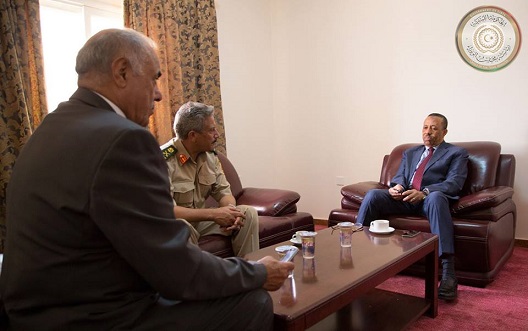 Libya stands today at the precipice as inter-militia fighting threatens to derail an already fragile transition in a tumultuous region. While the raging conflict can be distilled to a fight between Islamist and non-Islamist forces, in truth the local dynamics are far more complex—involving different tribal, criminal, and government-affiliated factions vying for control over people, territory, and smuggling routes. In his recent work, Karim Mezran, senior fellow for the Atlantic Council’s Rafik Hariri Center, explains the degradation of security, politics, and the path towards reconciliation. Unless Libya’s international partners intervene quickly to support its tenuous progress, the world risks a new center of instability on the Mediterranean basin.
Libya stands today at the precipice as inter-militia fighting threatens to derail an already fragile transition in a tumultuous region. While the raging conflict can be distilled to a fight between Islamist and non-Islamist forces, in truth the local dynamics are far more complex—involving different tribal, criminal, and government-affiliated factions vying for control over people, territory, and smuggling routes. In his recent work, Karim Mezran, senior fellow for the Atlantic Council’s Rafik Hariri Center, explains the degradation of security, politics, and the path towards reconciliation. Unless Libya’s international partners intervene quickly to support its tenuous progress, the world risks a new center of instability on the Mediterranean basin.
In his opinion article on Al Jazeera, Mezran traces the roots of the current conflict to the collapse of the legislative branch in Libya—the General National Congress—and the rise of a non-Islamist backlash against Islamist forces in the form of General Khalifa Haftar, both of which undermined the government attempt to coopt moderate Islamists and marginalize extremists:
Control over the Tripoli airport gave Islamists control over air traffic through Libya and prevented the political progress they fear would, at best, marginalize and, at worst, persecute them. The feed-forward cycle of violence has had an enormous human cost that grows worse by the day.
Mezran’s comments in the New York Times show how the diplomatic flight of international actors from the conflict zone could actually reduce the possibility of a near-term resolution:
Understanding the Western world’s hesitation to get involved in Libya (or any Middle East conflict) again, it nonetheless falls to those actors to provide immediate assistance or face the possibility of an all-out civil war—the far greater cost of which will fall in economic, humanitarian, strategic, and moral terms:
The solution at this stage, according to Mezran, lies in doubling-down on efforts to reboot the National Dialogue for a meaningful discussion between all stakeholders surrounding the country’s future. Without a halt to violence, however, the discussion cannot take place. The United Nations in partnership with regional actors can help end the violence, but it will require significant political will to do so. Without it, the consequences could stretch far beyond Libya’s borders.
Image: Interim-Prime Minister Abdullah al-Thinni discusses the security situation with Libya's Army Chief-of-Staff, August 1, 2014. (Photo: Libya Al Mostakbal)
